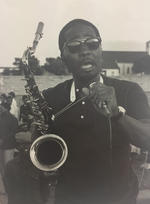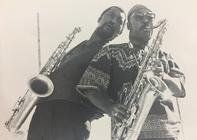Jazz Leader

There are few South African jazz performers as magnificent as Cups Nkanuka. His unusual name is one of legend among local jazz enthusiasts, as he had a profound impact on SA jazz throughout the 1950’s. He was part of the jazz generation that found inspiration from American jazz - he was one of the pioneering musicians to fuse African rhythms with Western jazz.
Ephraim 'Cup 'n Saucer' Nkanuka was born in Kensington, Cape Town in 1931. Interestingly, he had no given name. The name ‘Cup 'n Saucer’ was the name his grandfather used to refer to him, and the name stuck. He was given the name Ephraim by his teacher who was too shy to call him ‘Cups’.
Cups started playing trumpet in Mra Ngcukana's big band, The Swingettes in 1950 before Mra's sister, Nonyaniso Ngcukana (the first female jazz musician in Langa) taught him tenor saxophone. He also played in another big band called Merry Macs but later played in smaller outfits like The Hip Cats and The Jazz Ambassadors, where everyone got the chance to solo.
He was a patient teacher and mentor to many of the musicians who made up the big bands of the 1950’s: The Young Rhythm Chordettes, The Twelve Disciples of Jazz and The Modern Choppers. He taught the musicians musical discipline and to respect other musicians. Winston Mankunku Ngozi became his most successful student.
Pianist Buggs Gongco used to call Cups 'the technician', while he called Mra Ngcukana 'the musician'. Cups and Mra were exceptional partners in jazz: Cups was the planner - he planned in advance who was going to take solos for how long, while Mra was the improvisor - more creative, and never into planning.
Cups also led his own bands like The Jazz Ambassadors and The Peninsula Stars. He took inspiration from American jazz, the style of the performers and their approach to making music. Some of his top influences were Coleman Hawkins, Lester Young, Sonny Rollins, John Coltrane and Skip Phahlane. In 1962, he won best tenor player at the Cold Castle National Jazz Festival competition in Johannesburg.
Cups was a natural leader - he commanded the stage and had a real spunk when he performed. His emotions flowed through the saxophone and the sounds he produced were awe-inspiring.
Beloved Figure

Cups’ career came to a halt in the 1960’s when he stopped performing due to family pressures and responsibilities. After getting married, he got a full-time job to support his young family. He did, however, still perform occasionally throughout the 1960s. He worked as a clerk at Afrox until his retirement in 1993.
In 2002, Cups made his first public performance in over thirty years in Pascale Lemche's film ‘Sophiatown’. In 2008, he was honoured by the Ngcukana brothers in the Living Heritage Festival, which turned out to be his last performance before died in 2012. Cups was a beloved figure in the Langa jazz community.
He left a noteworthy mark on local jazz and the unique development of SA music. One of his students and fellow musician, Duke Ngcukana, felt that Cups taught him many valuable lessons."The most important thing I learned from Bra Cups was that you had to be in sync with the other hornsmen, breathe together, stop together, chop together, he was very strict around that part. He was very strict in terms of phrasing and developing a good tone.
You were required to play softly, not to blow hard. He gave us the right technique. At that time, there were no microphones for the horn section." Pianist Vincent Kolbe remembers Cups as a happy-go-lucky guy. "I remember Cups very warmly because he was very encouraging.” Syfred Woodrow Dlova, Langa trumpeter and photographer, was trained by Cups. "Cups trained us from the very beginning.
He opened our eyes, literally, to be able to read music and play. He is the person who is responsible for all our tuition, drums, everybody in the band received instructions from him. All our skills, we got from his lectures."